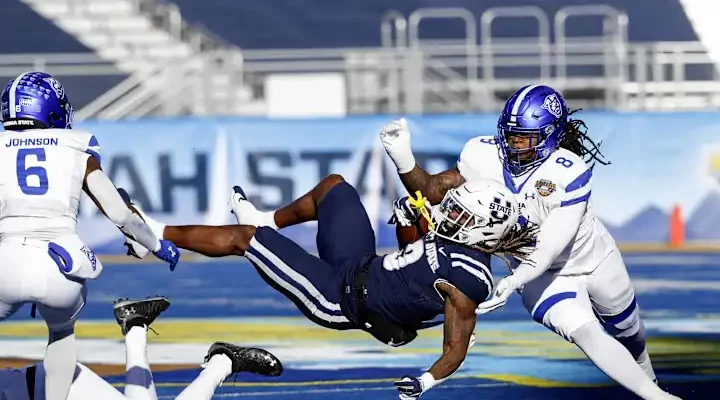Judge Tosses Another NCAA Lifeline—For South Carolina’s Rahsul Faison, the Court’s Decision Isn’t a Play You Want on Your Resume
South Carolina Gamecocks running back Rahsul Faison has found himself in eligibility limbo, and now, a fresh and grim development hits like a low block. A federal judge in California has denied preliminary injunctions for two other players—players with cases similar to Faison’s. It doesn’t directly apply to his situation, but it sure doesn’t look like a sign pointing in the right direction.
Let me break it down for you.
Faison, after transferring from Utah State, has formally asked for an additional year of college eligibility. He’s played only three seasons post–high school—one in junior college and two at Utah State. Yet the NCAA’s five-year clock has already expired, leaving him hoping for a waiver under that wave of precedents like Vanderbilt quarterback Diego Pavia’s recent court win.
But hold up. It appears that the judicial path is growing rocky. Just recently, a judge in the U.S. District Court for the Central District of California ruled against preliminary injunctions from players at USC and UCLA—players who, like Faison, hoped for courtroom relief to keep playing. That judge said no—and even though none of those rulings mention Faison by name, it still feels like a dagger to his case.
Here’s how that matters. Items like these junk the notion of precedent into the trash. Shouldn’t a win for one player set a pattern for identical cases? In theory, yes—but what’s happening is the opposite. These decisions are described as “luck of the draw,” with courts across the country all doing their own interpretive dance. Faison’s jam? Not great, to be frank.
Let’s look at the reality through the lens of a South Carolina fan—or worse, a hopeful player just trying to line up on the offensive side of the ball.
Faison has done his part. He enrolled early, he practiced hard, he hired a top NIL lawyer—Darren Heitner—to make his case. He’s grinding every day, taking reps, learning the playbook, investing in every rep. He made the portal transfer, moving to the SEC with serious expectations. Coaches and staff are ready to roll. Momentum was building fast.
Now? It’s all wait, wait, wait.
The school has been transparent with the NCAA, sending paperwork back in January, giving whatever they asked for, multiple times. Still nothing. The courts in other cases just dealt a blow to any hope of judicial relief. And judges historically don’t bend easily on eligibility beyond the NCAA’s established rules, unless something strongly compels them.
For Faison, it’s about more than dollars or stats. He’s not just fighting for another year of stats or another shot at glory—this is his shot at stability and identity. He’s already battled through years of uncertainty: grayshirting, junior college, transfer challenges. And now he’s in Columbia, expecting to compete, bringing his best self to the Gamecocks. But with no ruling in sight, the whole season feels like a fragile setup.
And now with court rulings against USC and UCLA cases, there’s no momentum in that legal direction. If they’re letting those cases fall through, what are the odds Faison’s waiver sails through? Slim.
It’s heart-wrenching, especially when you consider what he adds—a hard-nosed runner with over 1,100 yards last season, a leader in that RB room, a high-upside weapon in the SEC. South Carolina built part of its offense around him—only to now stand on the track waiting for the starting gun that might never sound.
Some people talk about “luck of the draw” in college football—but in the legal system, that phrase just feels cheap. For Faison, it feels cruel.
At this point, every opposing court decision puts a darker shadow over his prospects. The NCAA could still rule in his favor—there’s always that—but the backdrop now is darker, murkier, less hopeful.
He’s got options. He could pivot to the NFL supplemental draft, try to make it as an undrafted free agent, or just wait on the court or NCAA to give clarity. But make no mistake—none of that was part of the plan. Not this year, not in Columbia.
Meanwhile, practices go on. He’s running sprints, joining drills, studying film, building rapport, building trust—without knowing if it all matters. That’s got to eat at anyone. Coaches talk about controlling what you can control—but how do you “control” eligibility when the decision rests in halls you can’t walk into?
This isn’t just about a roster spot. It’s about fairness, player rights, institutional red tape, and inconsistency. Faison’s story isn’t unique in modern college football—but it’s one of the more frustrating and human versions of the mess we keep letting drag on.
Imagine being ready to step onto the field and make an impact—and getting slammed by a judicial decision without so much as a court date on your calendar. That’s what this looks like now.
For now, South Carolina doesn’t know who it’ll have at running back. Faison trains like he’ll play, but everyone else has to plan like he won’t. That makes it tough on coaches, teammates, play-callers—and fans.
This isn’t a headline you wanted. It’s not a twist you hoped for. But if the goal was clarity? This ruling just cast Faison’s path into shadow. And that’s a loss, not just for him, but for college football.
So as fall camp crawls closer and the season opener looms, realize this: for Rahsul Faison, the game hasn’t just been played on grass—it’s being tested in the courtroom. And with the judge’s recent denials of other cases, the tide is turning against him. Colder days are ahead, and for Faison, the question isn’t just “when can I play?”—it’s “can I play at all?”
That’s harsh. That’s real. And that’s what college football looks like right now.



